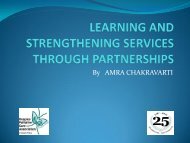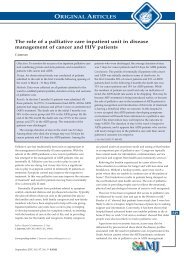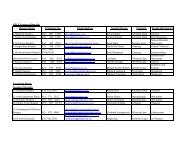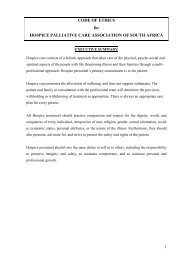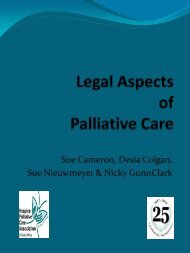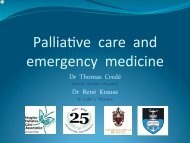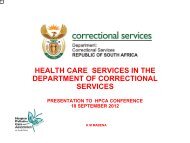Dying and The Law - Hospice Palliative Care Association of South ...
Dying and The Law - Hospice Palliative Care Association of South ...
Dying and The Law - Hospice Palliative Care Association of South ...
You also want an ePaper? Increase the reach of your titles
YUMPU automatically turns print PDFs into web optimized ePapers that Google loves.
INTRODUCTIONEstate Planning – putting proper plansin placeOften after the death <strong>of</strong> a family member,people are confronted with overwhelming<strong>and</strong> confusing administrative challenges.One <strong>of</strong> the most simple, yet commonchallenges facing the family <strong>of</strong> a deceasedperson is the lack <strong>of</strong> correct documentationsuch as a missing:• identity document• birth certificate• marriage certificate• Insurance policyNot having the correct documentationadds to the administrative burden <strong>of</strong> thedeceased’s family because they will needto sort out the missing documentationafter the person has died.If proper plans are put in place when weare well <strong>and</strong> our minds are still clear, thestress <strong>of</strong> coping with such challenges isgreatly reduced. Simple preparationbefore death – called estate planning –helps with making decisions about:• What documentation is necessary• Where your important documentsare to be kept.• What you would like to have in placefor your loved ones after you are nolonger around to care or provide forthem.• <strong>The</strong> importance <strong>of</strong> having a will /ornot. At least providing adequateinstructions about the property thatyou own, your savings accounts <strong>and</strong>other financial investments such as apension or insurance.‘<strong>The</strong> old man never had an IDso when he was killed themortuary treated his body withno respect <strong>and</strong> they refused tokeep his body at the mortuary.We had to run around <strong>and</strong> findthe chief in his area who wouldallow the old man to be buriedquickly because the mortuarywanted to throw him out.Luckily we found his birthcertificate.’Terms you will find in this chapterAdministration: organising <strong>and</strong> takingcare <strong>of</strong> paper work <strong>and</strong> <strong>of</strong>fice tasksAssets: property you own such as yourhouse, your car, your furniture, yourbooks <strong>and</strong> your money. Your assets canhelp to pay <strong>of</strong>f any outst<strong>and</strong>ing debts.Best interests <strong>of</strong> the child: If there is aconflict between the child’s interest<strong>and</strong> the parents’ rights then the child’sinterest comes firstBurial order: an order that is made oncethe death has been registered. Thisallows the person to be buried.<strong>Care</strong>: <strong>The</strong> day-to-day care <strong>and</strong> personalgrowth <strong>of</strong> a minor child. Making surethe child is fed, clothed, healthy, loved<strong>and</strong> nurtured.Customary succession: inheritingaccording to traditional African law.Death notice: a government form thatneeds to be filled in by someone whoknows the personal details <strong>of</strong> thedeceased <strong>and</strong> is able to identify thedeceased.Death certificate: this is a governmentform issued by the Department <strong>of</strong>Home Affairs. A funeral director orundertaker can help you get one.Debt: money you owe to someone,referred to as liabilities when dealingwith deceased estatesEstate: all the things <strong>and</strong> the moneyowned by the person who has died –sometimes referred to as a deceasedestateExecutor: the person, appointed by theMaster <strong>of</strong> the High Court, who windsup <strong>and</strong> administers the deceased estate,helping with the distribution <strong>of</strong> theproperty. making sure your property isdivided up according to your wishes asset out in the will. See executor’s duties.Formalities: set rules that must befollowed to make something legalFreedom <strong>of</strong> testation: people have thefreedom to decide what they want todo with their property after they dieGuardianship: the legal responsibility<strong>of</strong> a minor child.Heirs: a person who inheritsHigh Court: the supreme guardian <strong>of</strong>all childrenInheritance: property, belongings ormoney left to someone by a deceasedpersonIntend: you mean to do something <strong>and</strong>you underst<strong>and</strong> what you are doingIntestate: dying without a willMarital regime: the type <strong>of</strong> marriagecontract that you have entered intowith your spouse (see inset below)Master <strong>of</strong> the High Court: government<strong>of</strong>ficial with the duty to oversee theproper administration or proper windingup <strong>of</strong> deceased estates. <strong>The</strong>re is aMaster’s Office in every provinceSpouse: the person to whom thedeceased was married. This will be thehusb<strong>and</strong> or wife, or partner in a samesex marriageTestate: dying with a willTrustee: a person appointed by the HighCourt to take care <strong>of</strong> a child’s/person’sestateWinding up: closing down a person’sestate, a person’s propertyChapter 12 | <strong>Dying</strong> <strong>and</strong> <strong>The</strong> <strong>Law</strong>179



